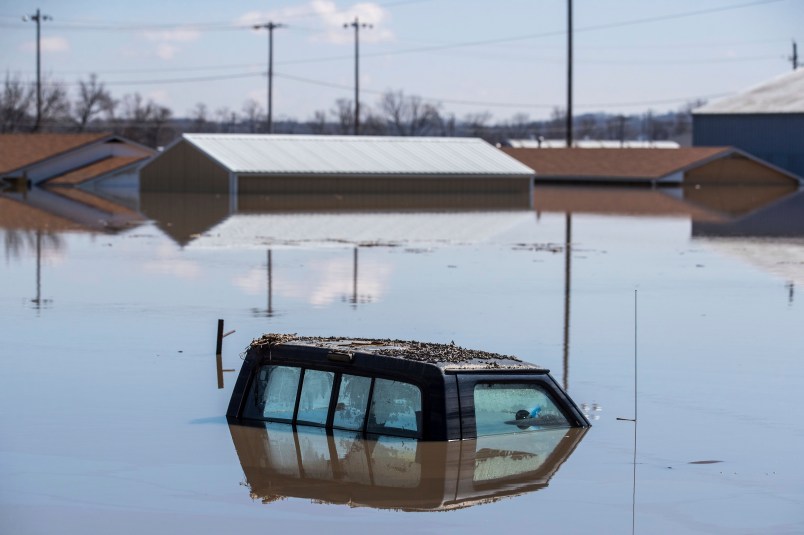KANSAS CITY, Mo. (AP) — Missouri Gov. Mike Parson declared a state of emergency Thursday following flooding that left several people stranded and continues to cause damage and strain levees in several Midwest states.
Parson’s action will allow state agencies to work directly with local officials responding to flooding. Parson, along with the state’s Emergency Management Agency director and other officials, plan to meet with local leaders and survey damage Thursday.
“The rising floodwaters are affecting more Missouri communities and farms, closing more roads and threatening levees, water treatment plants and other critical infrastructure,” Parson said in a statement. “We will continue to work closely with our local partners to assess needs and provide resources to help as Missourians continue this flood fight and as we work to assist one another.”
The emergency declaration comes after Missouri water patrol troopers worked into the night Wednesday, pulling four people from homes and three others from a boat that ran out of gas around the small town of Craig. People stacked sandbags at a nearby water treatment plant in Forest City on Thursday, while another levee breach across the river from Atchison, Kansas, threatened two towns where most residents had already left.
The flooding in Craig began after yet another levee breach, and several homes were inundated with water. A local ethanol plant was also shut down amid the flooding.
“People are trying to get items out and preparing for rising floodwaters,” Missouri State Highway Patrol Sgt. Jake Angle said. “You are going to see more reports coming out of breaches and water over the roadway as the day goes on.”
The Missouri River has swelled following heavy rains and snowmelt earlier this month. The flooding has claimed three lives, damaged thousands of homes and busted about 20 levees in Nebraska,Iowa and Missouri.
The U.S. Army Corps of Engineers said water also was flowing over several other levees, including one near Missouri’s Bean Lake.
Deb Hooper, who lives near the lake, told KMBC-TV that she has been packing for a week and even removed the water heater, but she hopes to hold out.
“Last night, they came and told us it was, like, 2 inches (5 centimeters) below the levee,” she said, adding that she was warned to leave but declined. “I’m, like, ‘No, there ain’t no water yet.'”
In southwest Iowa, barriers protecting about 2,300 people and thousands of acres of farmland simply weren’t high enough to withstand the river, said Pat Sheldon, president of the Benton-Washington Levee District.
Sheldon told television station KNCY on Wednesday that the river levee “performed brilliantly for what it was designed to do, but it just sent more water at us than we had height.” He said it took $150 million to repair his district’s levees after flooding in 2011, but he estimates it could cost $500 million to do so after this year’s disaster.
In Missouri, the river was expected to crest Friday in St. Joseph at the third-highest flood level on record. Water was filling a casino parking lot in the city, though only about half a dozen homes in the city aren’t protected by a federal levee. Military planes were evacuated last week from nearby Rosecrans Air National Guard base.
The flooding has also taken a heavy toll on agriculture, inundating tens of thousands of acres, threatening stockpiled grain and killing livestock.
Nebraska’s governor said his state has suffered nearly $1.4 billion in estimated losses and damage, including $840 million in crop and cattle losses.
Members of the Nebraska Army National Guard used a helicopter Wednesday to drop 10 round hay bales to stranded cattle in various spots near Richland, which is about 80 miles west of Omaha.
Gov. Pete Ricketts also estimated that more than 2,000 homes and 341 businesses have been damaged or destroyed in Nebraska alone.







Trump has every right to declare an Emergency!!
So the red state farmers who voted for Trump are losing their harvested soybeans, that they couldn’t sell to China because of Donnie’s tariffs, to flooding of grain storage bins, and will be significantly delayed in 2019 planting, all due to climate change that Donnie says is fake.
How’s that working out for you, folks? Did your Trump brand paper towels arrive yet?
Near Future Trump in MO - “I think the floods were caused by lots and lots of beautiful water. Farmers need water that’s usually wet. But not this much water which causing flooding and that’s bad. Flooding is somethimes not good. And there was no collusion.”
Jackson Browne - Before the Deluge
Before the Deluge
Stevie Ray Vaughn - Texas Flood
Texas Flood
All because of;